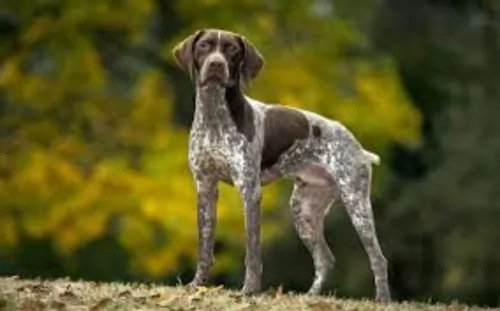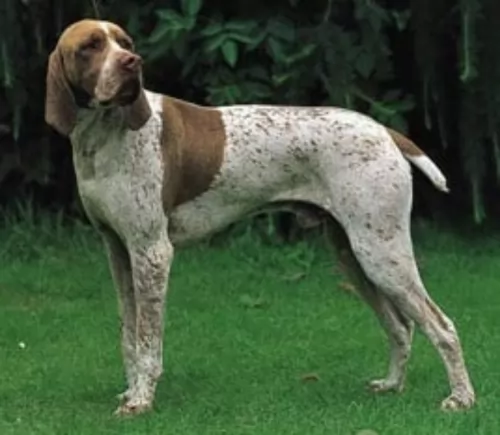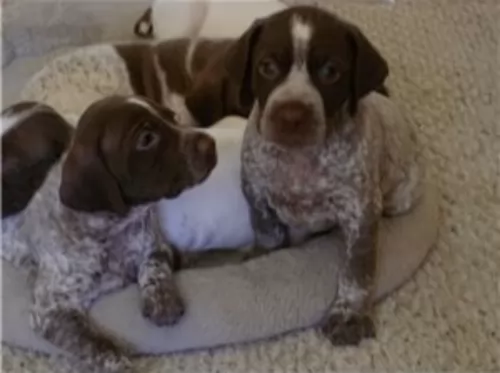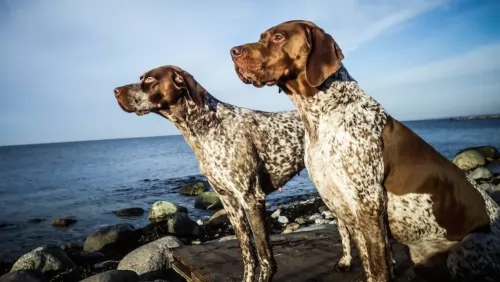 Petzlover
Petzlover Braque Francais (Gascogne Type) is originated from France but Rafeiro do Alentejo is originated from Portugal. Braque Francais (Gascogne Type) may grow 6 cm / 2 inches shorter than Rafeiro do Alentejo. Braque Francais (Gascogne Type) may weigh 28 kg / 61 pounds lesser than Rafeiro do Alentejo. Braque Francais (Gascogne Type) may live 3 years more than Rafeiro do Alentejo. Both Braque Francais (Gascogne Type) and Rafeiro do Alentejo has same litter size. Braque Francais (Gascogne Type) requires Low Maintenance. But Rafeiro do Alentejo requires Moderate Maintenance
Braque Francais (Gascogne Type) is originated from France but Rafeiro do Alentejo is originated from Portugal. Braque Francais (Gascogne Type) may grow 6 cm / 2 inches shorter than Rafeiro do Alentejo. Braque Francais (Gascogne Type) may weigh 28 kg / 61 pounds lesser than Rafeiro do Alentejo. Braque Francais (Gascogne Type) may live 3 years more than Rafeiro do Alentejo. Both Braque Francais (Gascogne Type) and Rafeiro do Alentejo has same litter size. Braque Francais (Gascogne Type) requires Low Maintenance. But Rafeiro do Alentejo requires Moderate Maintenance
 The Braques Français – Gascogne – is a hunting dog from southern France’s Gascony region. Known also as the French Gascony Pointer, this dog has descended from Spanish and Italian Pointers. The dog was saved from extinction at the turn of the 20th century.
The Braques Français – Gascogne – is a hunting dog from southern France’s Gascony region. Known also as the French Gascony Pointer, this dog has descended from Spanish and Italian Pointers. The dog was saved from extinction at the turn of the 20th century.
There are actually two breeds of Braque français, with the other being somewhat smaller and known as Braque français, type Pyrénées. Whichever one you have, they are popular hunting dogs in France. The first breed club was established in 1850.
 Known also as the Portuguese Mastiff, the Rafeiro do Alentejo comes from Portugal and has always been used as guardian for livestock. Their numbers declined quite a bit when there was no longer a need for this kind of job.Today it is essentially a companion dog.
Known also as the Portuguese Mastiff, the Rafeiro do Alentejo comes from Portugal and has always been used as guardian for livestock. Their numbers declined quite a bit when there was no longer a need for this kind of job.Today it is essentially a companion dog.
The official standard of the Rafeiro do Alentejo was established in 1953. The dog is is recognized as a breed by the Portuguese Caniculture Club as well as the Federation Cynologique Interationale.
 The Braque Francais is a dog which looks much like the German Short-haired Pointer. The Braque Francais (Gascogne) is a large breed dog, standing roughly 56 – 69cm. Weight is most times dependent on height, but the average weighs between 35 and 55 pounds. The dog is attractively lean and muscular and the tails have always been docked, although rules and regulations see the breed with a long tail these days. The natural tail of the Braque Francais is medium length. The eyes of this breed are brown or yellow and the ears are medium in length and floppy. The coat of the Gascogne is short and dense and in two colors – white and chestnut patching and mottling.
The Braque Francais is a dog which looks much like the German Short-haired Pointer. The Braque Francais (Gascogne) is a large breed dog, standing roughly 56 – 69cm. Weight is most times dependent on height, but the average weighs between 35 and 55 pounds. The dog is attractively lean and muscular and the tails have always been docked, although rules and regulations see the breed with a long tail these days. The natural tail of the Braque Francais is medium length. The eyes of this breed are brown or yellow and the ears are medium in length and floppy. The coat of the Gascogne is short and dense and in two colors – white and chestnut patching and mottling.
The dog is a keen tracker and is an excellent game and gun dog with some of them requiring more training than others. Training and socialization makes the Braque Francais an excellent, obedient pet who is eager to please and he is considered to be easily trainable, learning quickly. He loves his human family and is noted for his gentle, friendly nature, and he therefore makes and excellent family pet where there are children and other pets.
 The Alentejo is a large dog standing at between 64 and 75cm in height and weighing 45 to 60kg. He is a powerful dog with a deep chest, dark eyes, floppy ears. His coat is short to medium length, thick and straight. The color of the coat is a mix of fawn, a wolf grey, white, cream and black.
The Alentejo is a large dog standing at between 64 and 75cm in height and weighing 45 to 60kg. He is a powerful dog with a deep chest, dark eyes, floppy ears. His coat is short to medium length, thick and straight. The color of the coat is a mix of fawn, a wolf grey, white, cream and black.
This is a serious dog with a calm demeanour about him. It doesn’t matter how calm he is though, as every dog will require training ad socialization if you want to enjoy having an obedient, well mannered dog around you. This is particularly important with a large, independent, self-confident, territorial dog like this.
He isn’t an aggressive dog but he is protective, wanting to guard and look out for his human family. They are dogs that get on well with children and other pets in the home, being wary of strangers.
They’re not recommended for life in small properties in the city as he requires a large garden at least.
 The attractive Braque Francais is a calm, contented dog who is also affectionate, social and intelligent. He is already a well mannered dog but will do even better with training and socialization. However, Braque Francais don’t take well to aggressive training and done the wrong way, the dog can end up being timid and confused.
The attractive Braque Francais is a calm, contented dog who is also affectionate, social and intelligent. He is already a well mannered dog but will do even better with training and socialization. However, Braque Francais don’t take well to aggressive training and done the wrong way, the dog can end up being timid and confused.
Wanting to please and being an intelligent dog, training should be fun, lighthearted but firm. In exchange you’re going to have an awesome friend from this wonderful, loving dog breed.
 The Rafeiro do Alentejo is a quiet dog, but intelligent and strong-willed. Training and socialization will make him easy to get on with.
The Rafeiro do Alentejo is a quiet dog, but intelligent and strong-willed. Training and socialization will make him easy to get on with.
He will become an excellent companion, and can come indoors because he is well mannered and considerate. He was bred to be a guard dog, and the responsibilities he had taking care of livestock has been transferred to looking out for- and protecting his human family.
He makes a wonderful pet and companion, even with children and other pets, more so when brought up correctly by loving, firm, consistent dog owners.
 You won’t find many health issues with this active breed but nonetheless hip and joint issues will need to be watched. If you are considering a Braque Français puppy, you’ll want to be selective in choosing a responsible breeder. A healthy puppy with the right environment, can get to up to 15 years of age.
You won’t find many health issues with this active breed but nonetheless hip and joint issues will need to be watched. If you are considering a Braque Français puppy, you’ll want to be selective in choosing a responsible breeder. A healthy puppy with the right environment, can get to up to 15 years of age.
Ectropion and entropion in dogs affect their eyelids. Ectropion is where the eyelids roll outward, whereas entropion is where the eyelids curve inward, irritating the eye. Because visual and skeletal problems occur in this breed, it can be recommended that owners have their pets tested by both the Canine Eye Registration Foundation as well as the Orthopedic Foundation for Animals.
 The Rafeiro do Alentejo is a generally healthy dog breed, and with good care can get to 11, 12 or 13 years of age.
The Rafeiro do Alentejo is a generally healthy dog breed, and with good care can get to 11, 12 or 13 years of age.
Of course with a large dog like this, it is always a good idea to be aware of canine hip dysplasia, particularly because this is a large dog with a deep chest.
This makes him also vulnerable to bloat, a condition where the stomach swells with gas and which can be life threatening. Other things to watch for are ear infections and parasites.
 Brushing the coat twice a week will get rid of loose hairs and maintain the sheen of the coat. Also, as a floppy eared breed, attention should be given to the ears to prevent infections. He will also need to have his teeth brushed with dog toothpaste and brush to prevent the build-up of damaging plaque and his nails will also require a clipping if they don’t manage to wear down naturally.
Brushing the coat twice a week will get rid of loose hairs and maintain the sheen of the coat. Also, as a floppy eared breed, attention should be given to the ears to prevent infections. He will also need to have his teeth brushed with dog toothpaste and brush to prevent the build-up of damaging plaque and his nails will also require a clipping if they don’t manage to wear down naturally.
Daily activity will be needed for this dog and he will want a walk every day. He certainly isn’t a dog you can leave indoors or outside in your backyard day after day. Any activities that require physical exertion will be good because they are exceptional athletes. If you are a cyclist or a runner, take him with you – he’ll love it.
Your Braque Francais loves energetic activities and for this he will require an excellent nutrient-rich diet. Nutrient-rich dog foods are higher in protein and fat and lower in carbohydrates. It’s important to check out the carbohydrate content in commercial dog foods to avoid those one high in carbohydrates.
Your vet can always advise you on a good quality food and you can always give him your own home-prepared foods which include rice, vegetables and meat. Certainly include some raw meat into his diet every now and then to avoid skin problems. Fresh, cool water must be available to him night and day.
 Make your grooming time with this serious, calm canine friend of yours a special bonding time. His coat simply requires a brush twice a week to keep it healthy and shiny.
Make your grooming time with this serious, calm canine friend of yours a special bonding time. His coat simply requires a brush twice a week to keep it healthy and shiny.
While bushing him, run your hands over him to make sure there aren’t any unusual lumps. Check inside the floppy ears to make sure they’re not red which could be the start of a painful ear infection.
Look a his nails and trim them if they’ve become too long. Check inside his mouth and make sure there aren’t any black, rotten teeth as this can seriously impact the health of your pet.
Options for exercise will include long walks and a chance to run off his leash. In the back yard it will be to his benefit to throw balls for him to fetch. You can even bring him indoors and play some calm games with him. He should have exercise every single day.
Good food is needed for good health. It is always convenient to make use of the commercially manufactured dog foods there are on the market.
You don’t want to feed this to your dog day after day so provide your pet with some tasty home-made food too. Dogs want simplicity and consistency with their diets so they don’t battle with upset stomachs and an unnecessary trip to the vet.
Some home-cooked food twice a week and added to the dry kibble can keep him healthy and happy. Boiled chicken, sweet potatoes, brown rice or pasta, carrots and spinach will be perfect for him. Chop the food up finely and add it into the dry kibble once or twice a week.
Some people even cook it in bulk, refrigerate it and warm up small portions to add to the kibble. Raw meat added in occasionally can also be a good treat. Make sure your pet is never without a constant supply of fresh, cool water.